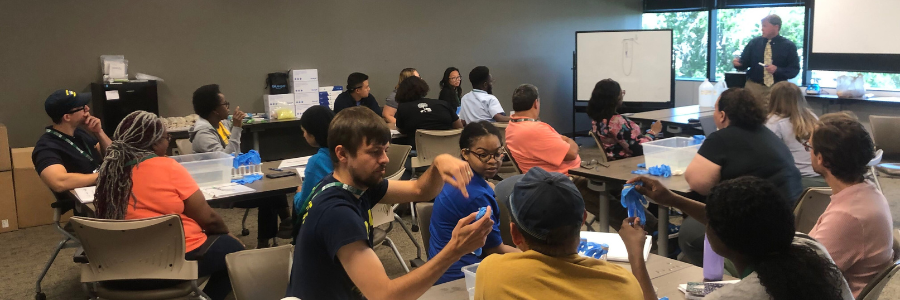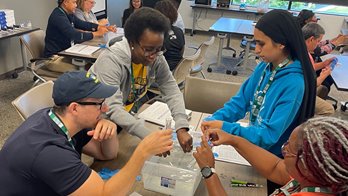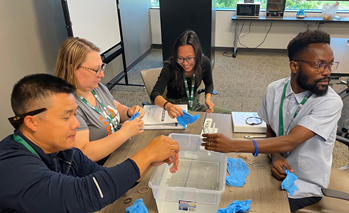Milwaukee Teachers Are Ready to Take Biotech Training to the Classroom
Devin Rose - August 21, 2023
The first official participants of the expanded Biotech Discovery Labs program are eager to bring CGT experiments to their students.

This fall, one group of Milwaukee middle and high school teachers will be returning to their classrooms armed with more biotechnology training and equipment than ever before.
The teachers were the first official participants of Biotech Discovery Labs: Teacher Training and Classroom Experience. This innovative program, which ASGCT piloted last summer, aims to increase access to the field of biotech through health and science education within Milwaukee Public Schools (MPS). ASGCT hopes the program will spark students’ interest in science and improve their access to better opportunities after graduation. The program is supported by a two-year grant from Bristol Myers Squibb.
 For four days in July, the teachers worked with ASGCT staff as well as a returning teacher and student intern from the pilot program to conduct experiments focused on DNA extraction, cat genetics, CRISPR, and more. Grant Holley, PhD, ASGCT’s Director of Science and Education, gave a talk on the basics of gene and cell therapy and other staff discussed ethical issues in the field. ASGCT Member Christina Fuentes, PhD, opened up about imposter syndrome and the importance of mentorship during her career.
For four days in July, the teachers worked with ASGCT staff as well as a returning teacher and student intern from the pilot program to conduct experiments focused on DNA extraction, cat genetics, CRISPR, and more. Grant Holley, PhD, ASGCT’s Director of Science and Education, gave a talk on the basics of gene and cell therapy and other staff discussed ethical issues in the field. ASGCT Member Christina Fuentes, PhD, opened up about imposter syndrome and the importance of mentorship during her career.
According to Dr. Holley, everyone came ready to learn, ask questions (and push hard for answers), and receive help when they needed it. The group of 16 was larger and more diverse than the pilot program and included four international teachers—three of whom moved to Milwaukee from Nigeria in the past few years for teaching opportunities.
“I was incredibly impressed with their professionalism, curiosity, willingness to work, and how well they helped each other—it was amazing,” Dr. Holley said.
Renee Strong, ASGCT’s Diversity, Equity, & Inclusion Program Manager, agreed the program was a “huge success.” Strong, a former teacher, emphasized not only how beneficial it would be for students, but also for science teachers who may not be as familiar with teaching the concepts of a more modern scientific field.
“There is nothing like this [program] to encourage the sciences in students and in the teachers who are facilitating the labs,” Strong said.
 Now that the teachers have been trained in the curriculum and lab equipment, they’ll take the labs back to their classrooms and ASGCT will collect data on how student participation progresses. ASGCT will also schedule classroom visits during the school year to see the program in action. In the future, Dr. Holley said with additional funding ASGCT may provide scholarships to high school students interested in moving forward in biotech upon graduation.
Now that the teachers have been trained in the curriculum and lab equipment, they’ll take the labs back to their classrooms and ASGCT will collect data on how student participation progresses. ASGCT will also schedule classroom visits during the school year to see the program in action. In the future, Dr. Holley said with additional funding ASGCT may provide scholarships to high school students interested in moving forward in biotech upon graduation.
For Strong, the eagerness of the Milwaukee teachers demonstrated “how desperate we should be to get these types of labs and lessons into other underrepresented areas.”
“This has a much bigger reach that I hope we see the ripple effects of for years to come in biotech sciences,” she said. Dr. Holley pointed out that one teacher has already reached out to him twice in the last month for more resources.
ASGCT is happy to share the program and help other organizations reproduce it in their communities. If you’re interested in learning more about the program, please contact Dr. Holley at gholley@asgct.org.
Devin is ASGCT's communications manager.
Related Articles